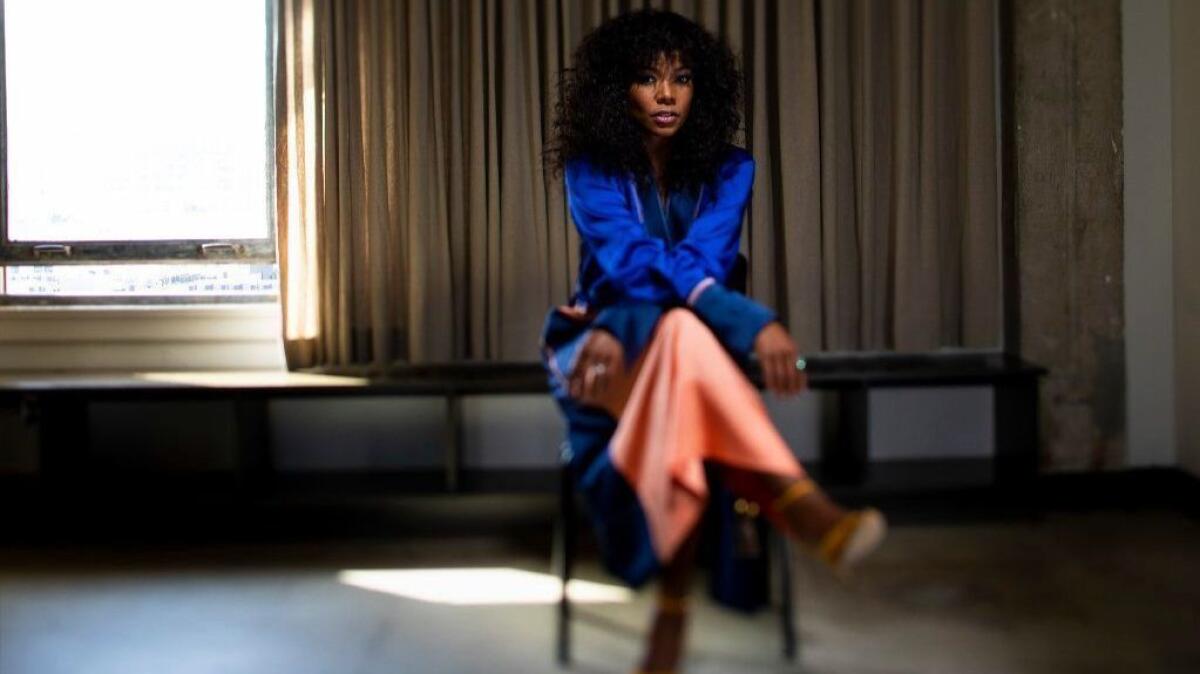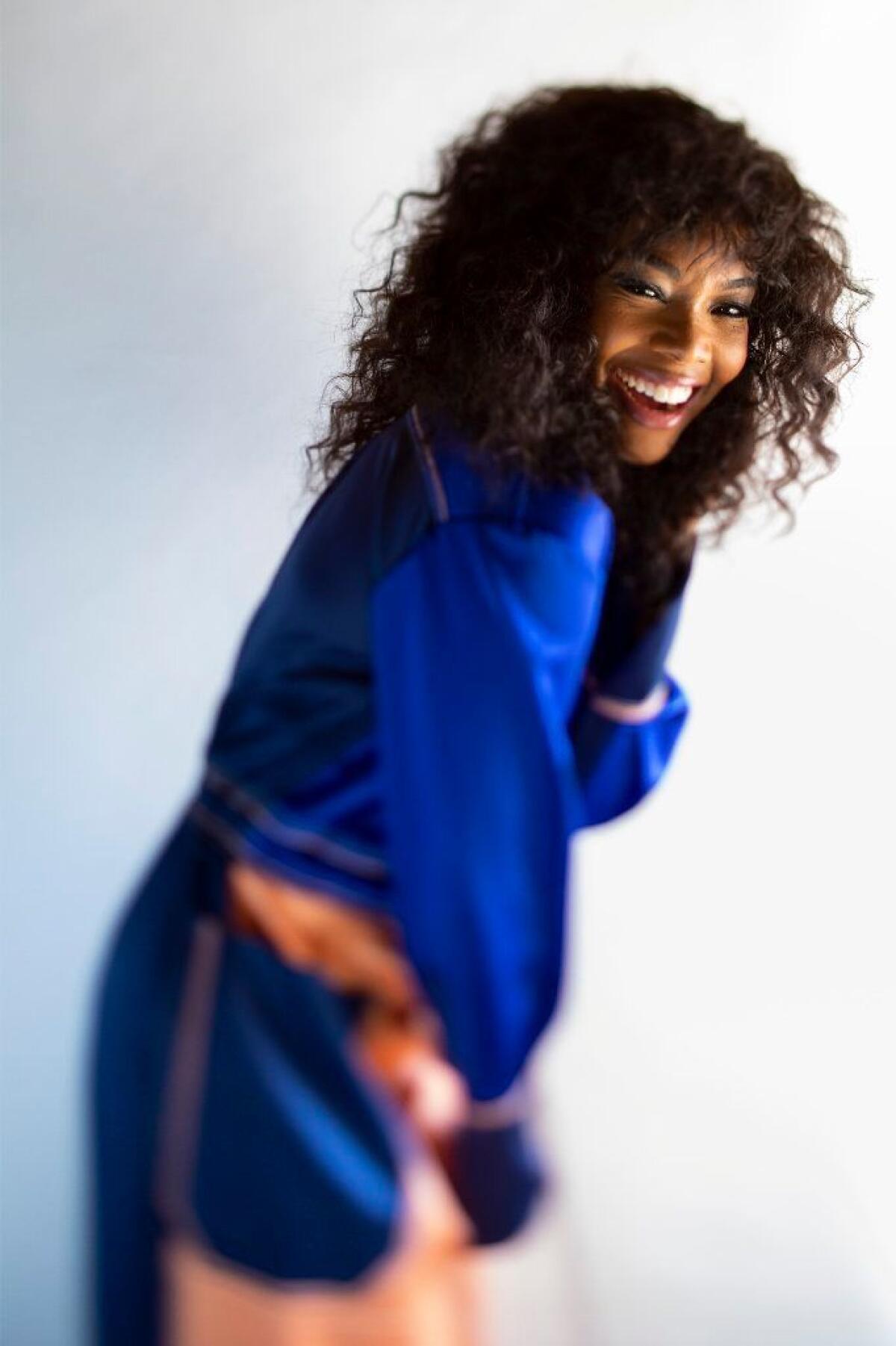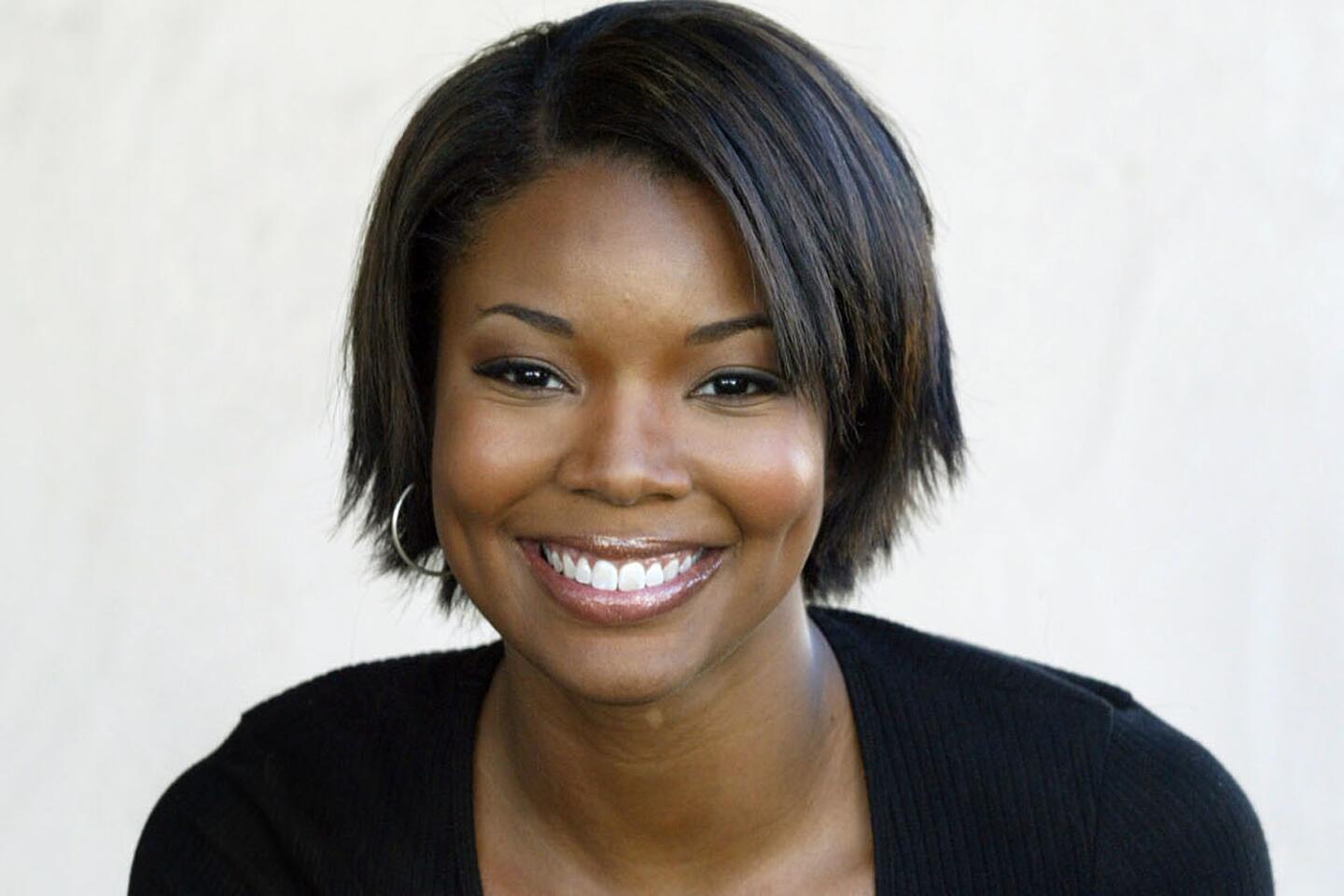‘Breaking In’ lets Gabrielle Union get all wild, angry and unhinged

The last time Gabrielle Union was looked at as an actress who could do action movies was 2003. That was when she starred in “Bad Boys II” and “Cradle 2 the Grave” — just five months apart — opposite genre heavyweights Will Smith and Jet Li, respectively.
“In your mind, and what they tell you, is ‘This is your career trajectory,’” she said, her hand gesturing toward an imaginary list of opportunities. “‘You are the “it girl.” The world is your oyster. You’ll have your choice of roles. You can come back to action any time.’”
But that’s not what happened. While roles in everything from Tyler Perry’s “Daddy’s Little Girls” and “Good Deeds” to Chris Rock’s “Top Five” and Nate Parker’s “The Birth of a Nation” showcased her dramatic and comedic chops, it still seemed Hollywood placed the actress in a more limited box.
Only now, 15 years later, is Union making a return to action as the star of “Breaking In,” in theaters Friday.
“It’s the opportunity I had been looking for and not getting,” she said.
“Breaking In” follows Shaun, played by Union, a mother of two who returns to her childhood home following the death of her father. While there, home invaders abduct her children, played by Ajiona Alexus and Seth Carr. The thriller examines the lengths a mother will go to to protect her kids.

Gabrielle Union stars in the trailer for “Breaking In.”
While Union admits the best part of the job was “working out a lot of my aggression [while] being encouraged to be more physical,” it’s the role of producer, which she shares with prolific duo Will Packer and James Lopez, that was most rewarding. It was actually the package deal of starring and having more creative control that sold her on the gig.
“When you’re on the other end of other people’s sense of generosity or idea of diversity and inclusion and their version of opportunity, it can be a little limiting. You’re at somebody else’s mercy,” she said. “I didn’t want it to be that way when I got a taste of control. I wanted to put people to work and not have them beg.”
And because Union had been a producer on a number of projects before — the Lifetime movie “With This Ring,” 2016’s holiday comedy “Almost Christmas” and her BET series “Being Mary Jane” — Packer, who pitched the film to Union, knew she’d be willing to get her hands dirty both in front of and behind the camera. (Packer, whose hits include “Think Like a Man” and “Ride Along,” also produced “Almost Christmas” and “Being Mary Jane’s” fourth season.)
“At the end of the day, producing is project management at the highest level,” he said. “You have to know how to efficiently use the resources at hand, how to get people to do things that they may or may not want to do and, ultimately, be creative enough to make sure you keep your eye on the vision of the project. She is good at all those things.”
James McTeigue, a frequent collaborator of the Wachowski siblings and the director of “Breaking In,” credited Union’s “fierce sense of determination” as the reason behind her success as star and impresario.
“She doesn’t take any [nonsense], so I can see what attracted her to the opportunity,” he said. “She’s already in her everyday life a badass and about motherhood and women’s rights and being a socially conscious person so she was perfect for this.”
I wanted this woman to be as wild and as angry and unhinged and desperate as the situation calls for.
— Gabrielle Union
Union was just happy to be able to make something that wasn’t dictated by public opinion, as television shows in the age of live tweeting often are.
“With ‘Being Mary Jane’ and other roles, you kind of become a slave to test audiences and social media and what people respond or don’t respond to,” she said. “The writers are steered by public reaction and character development is steered by what people want to see. So, it’s not always as fulfilling.”
“I wanted this woman to be as wild and as angry and unhinged and desperate as the situation calls for,” she said about her “Breaking In” character. “And I was able to do that without worrying about this test audience or what Black Twitter has to say. We just went with what made sense.”
That’s why, for example, Shaun doesn’t have special training that would give her an edge over the home invaders, as an earlier version of Ryan Engle’s script called for.
“That’s not realistic,” Union said. “If we’re going to do a story about a mom saving her kids, most of them aren’t Special Ops. But when you hear of people [lifting] cars … a mother’s strength knows no bounds. She perhaps does Zumba or Pilates, but she’s not a Navy Seal.”
Another goal Union had for the project: to place Shaun at the center of the story, and not as a side character for her children or husband.
“There’s a tendency to make mothers secondaries and footnotes [on screen],” she said. “It’s the idea that moms — their lives are small, their capabilities are few and far between, that they lost every sense of themselves and what makes them dope ... the second they had kids. I’m not interested in that.”
That’s why she doesn’t play too many mothers on screen. That and the fact that once an actress is seen as a “mother type,” Hollywood’s impression usually changes.
“I hadn’t actively been seeking out [mother roles],” Union said. “So, when the script came, I was like, ‘She’s got two [kids]?! And the older one is grown as ...?”
She was hesitant because “the older your kids get [on screen], the older people think of you,” she said.
“I’m trying to preserve the ‘Bring It On’ years as long as I can. That is the fear for me of playing mothers.”
I think we’re giving people allergies, but they’re dealing with it.
— Gabrielle Union
Union has a habit of racially profiling her fans, or at least she used to. Years ago, she’d be able to pinpoint exactly which film an approaching admirer had seen.
Was it 2000’s “Bring It On,” the exploration of cultural appropriation via two rival and racially different high school cheerleading squads? Or 2003’s “Bad Boys II” where she played Syd, the special agent sister of Martin Lawrence’s detective? Or 2001’s romantic comedy “Two Can Play That Game” from which her portrayal of the ponytail-swinging, man-eater Conny is now a popular meme and GIF?
But now, “I can’t call it,” she said about her growing fan base that is more diverse than ever. “It just is what it is.”
Still, she’s aware that it was the lower-budget black films — like “Two Can Play That Game” — that gave her career longevity.
“Those smaller movies that were for us, by us — I call it FUBU filmmaking — once they hit cable, they became the world’s property,” she said.
And with all four seasons of “Being Mary Jane” now streaming on Netflix, her audience is “much wider and whiter and broader,” she said, especially for “a decidedly black show made for black women.”
When “Being Mary Jane” debuted as a TV movie on July 2, 2013, it was in the shadow of “Scandal,” the Shondaland series that made Kerry Washington the first African American female lead in a network drama in almost 40 years. (The first was Teresa Graves as an undercover cop in 1974’s “Get Christie Love!”) But when the Union-fronted project pulled in over 4 million viewers, it jump-started the series.
The show, about the life of Mary Jane Paul, her work, family and the popular talk show that she hosts, became representative to many, Union said, of the beautiful complexities that women in real life often embody but that are hardly ever fully reflected on screen. It’s a moment that’s coming to a close as BET announced that, in lieu of a fifth season, “Being Mary Jane” will wrap with a two-hour series finale movie this fall.
On the end of her show, Union said, “Mary Jane was a lifeline for a lot of people, and they feel robbed and erased.”
And with “Scandal” also coming to an end this year after seven seasons, she’s aware that black women in particular voiced concerns.
“It felt like a conspiracy to erase us and our messy parts,” she said. “That if you’re not going to be super negro and fighter of all things and a freak and a chef and a size zero and busty and snap back a week after having a baby and be a philanthropist, we don’t want to see you on TV.”
What we thought was a movement was a moment. ... It was fleeting. It felt like wet toilet paper.
— Gabrielle Union
Union however remains committed to telling such stories, using the platform she’s gained over her 20 years in the business to “see talent, where it is in the landscape and where it’s filling a gap and need not being met,” she said.
She’s starting with her production company I’ll Have Another — named as a nod to her bestselling memoir, “We’re Going to Need More Wine” — and a first-look deal with Sony Pictures TV, the studio behind her NBC drama pilot “L.A.’s Finest,” an offshoot from the “Bad Boys” franchise.
“We’re not going to be known for one type of project,” she cautioned. “I want our slate to be as random and diverse as my tastes: ‘13 Reasons Why’ and ‘On My Block’ and random John Mulaney specials.”
The 45-year-old actress credits seeing other black actresses getting involved with producing more heavily, and being successful at it, for her recent ambitions.

“Kerry [Washington] is doing it. Zoe [Saldana] is doing it. Viola [Davis] is doing it. Octavia [Spencer] is doing it. And they didn’t die and their [work] is making it to screen and it’s good,” she said. “And I can do it too. But sometimes you’ve gotta see it first and know that nobody is going to die.”
There is a sisterhood among these women that ensures success, she continued, noting that when she got her production deal, she called Washington and asked how to find an executive.
“My generation doesn’t want to watch anyone fail. They’re not delighting in anyone’s failures or misery. There’s room for everyone because we’re not all coming up with the same ideas. And the more people we can put on, this moment becomes a movement of true inclusion and real opportunity.”
The change, she said, is finally hitting Hollywood, albeit slowly.
“Twenty years ago, I don’t know of a black woman who had a production company or a black showrunner who had deals in the kind of way Shonda [Rhimes] has,” she said. “It was like she said, ‘Water’s warm guys,’ and now everyone is cannonballing in.”
Union points to the increase of black faces at an exclusive event like the Vanity Fair Oscars party earlier this year as proof. There’s a popular photo circling on the web, by photographer Mark Seliger, that might as well be logged in Webster’s dictionary beside “black excellence.” In it, Union is joined by the likes of Ava DuVernay, Donald Glover, Angela Bassett, Tracee Ellis Ross, Shonda Rhimes and Janelle Monáe, among others.
“That has never happened,” Union said. “And no one is going anywhere. That’s the feeling because what we thought was a movement was a moment. Halle [Berry] won [an Oscar], then Jamie [Foxx], Octavia [Spencer] and then it was fleeting. It felt like wet toilet paper.
“But now, in the #MeToo, #TimesUp movement with Shonda and Mara [Brock Akil] and Tracy Oliver and Kenya Barris, nobody’s going anywhere. No one is relinquishing their spot or feeling like they have to shrink. And not only are we not shrinking, we are blossoming all at the same time, turning to the sun and planting more seeds. I think we’re giving people allergies, but they’re dealing with it.
“Take your Benadryl!”
Get your life! Follow me on Twitter (@TrevellAnderson) or email me: [email protected].
More to Read
Only good movies
Get the Indie Focus newsletter, Mark Olsen's weekly guide to the world of cinema.
You may occasionally receive promotional content from the Los Angeles Times.












